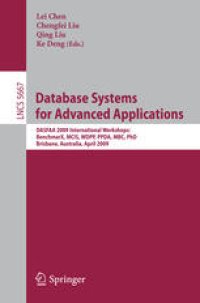
Ebook: Database Systems for Advanced Applications: DASFAA 2009 International Workshops: BenchmarX, MCIS, WDPP, PPDA, MBC, PhD, Brisbane, Australia, April 20 - 23, 2009
Author: Michal Krátký Irena Mlynkova Eric Pardede (auth.) Lei Chen Chengfei Liu Qing Liu Ke Deng (eds.)
- Tags: Database Management, Information Systems and Communication Service, Data Mining and Knowledge Discovery, Information Storage and Retrieval, Information Systems Applications (incl.Internet), User Interfaces and Human Computer Interaction
- Series: Lecture Notes in Computer Science 5667 : Information Systems and Applications incl. Internet/Web and HCI
- Year: 2009
- Publisher: Springer-Verlag Berlin Heidelberg
- City: Berlin ; New York
- Edition: 1
- Language: English
- pdf
DASFAA is an annual international database conference, located in the Asia- Paci?cregion,whichshowcasesstate-of-the-artR & Dactivities in databases- tems and their applications. It provides a forum for technical presentations and discussions among database researchers, developers and users from academia, business and industry. DASFAA 2009, the 14th in the series, was held during April 20-23, 2009 in Brisbane, Australia. In this year, we carefully selected six workshops, each focusing on speci?c research issues that contribute to the main themes of the DASFAA conference. Thisvolumecontainsthe?nalversionsofpapersacceptedforthesesixworkshops that were held in conjunction with DASFAA 2009. They are: – First International Workshop on Benchmarking of XML and Semantic Web Applications (BenchmarX 2009) – Second International Workshop on Managing Data Quality in Collaborative Information Systems (MCIS 2009) – First International Workshop on Data and Process Provenance (WDPP 2009) – First International Workshop on Privacy-Preserving Data Analysis (PPDA 2009) – FirstInternationalWorkshoponMobileBusinessCollaboration(MBC2009) – DASFAA 2009 PhD Workshop All the workshops were selected via a public call-for-proposals process. The workshop organizers put a tremendous amount of e?ort into soliciting and - lecting papers with a balance of high quality, new ideas and new applications. We asked all workshops to follow a rigid paper selection process, including the procedure to ensure that any Program Committee members are excluded from the paper review process of any paper they are involved with. A requirement about the overall paper acceptance rate of no more than 50% was also imposed on all the workshops.